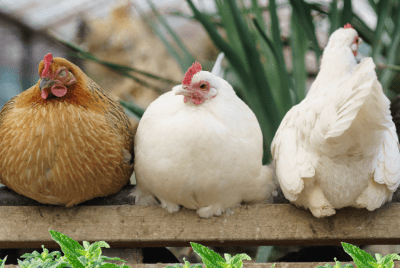Oregano for Chickens, Power Herb Unlocking their Best Health
The practice of incorporating herbs for chickens is not only a nutritious option but also a beneficial one for their overall health. Herbs such as oregano, basil, and thyme can provide a variety of vitamins and minerals that help boost their immune system and promote better egg production. Additionally, certain herbs like garlic and cilantro have natural antibacterial properties that can help prevent diseases in your flock. By adding a sprinkle of herbs to their feed or allowing them to forage in an herb garden, you can enhance the well-being of your feathered friends in a natural and holistic way.
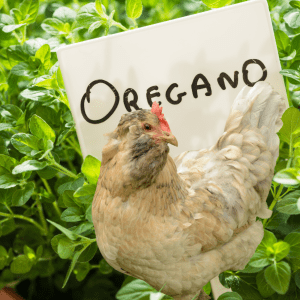
Key Takeaways:
1.Herbs are great for chickens: Herbs like oregano, basil, and parsley are not only safe but also provide health benefits for your chickens.
2.Nutritional benefits: Herbs are rich in nutrients such as vitamins, minerals, and antioxidants, which can boost your chicken’s immune system and overall health.
3.Easy to grow: Herbs are easy to grow in your backyard or garden, providing a cost-effective and convenient food source for your chickens.
4.Varied diet: Feeding herbs to your chickens can add variety to their diet and prevent boredom, leading to happy and healthy birds.
5.Consult a veterinarian: While many herbs are safe for chickens, it’s always a good idea to consult with a veterinarian or poultry specialist before introducing new foods to their diet.
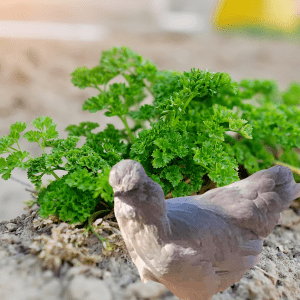
Understanding Chicken Physiology
Digestive System of Chickens
The digestive system of chickens is a complex and efficient mechanism that allows them to process a variety of foods. It consists of several organs, including the crop, proventriculus, gizzard, small intestine, ceca, and large intestine. Each of these plays a crucial role in breaking down food and extracting nutrients.
How Chickens Process Plant Materials
Chickens are omnivores, meaning they can consume both plant and animal matter. In terms of plant materials, chickens have a fascinating way of processing them. Their digestive system is equipped to handle fibrous plant matter, thanks to the presence of a gizzard. The gizzard contains small stones that the chicken swallows, which help grind down the plant material into smaller pieces for better digestion.
This intricate process allows chickens to extract imperative nutrients from plant materials, such as vitamins, minerals, and antioxidants. However, it’s important to note that some plants can be toxic to chickens, so it’s crucial to do thorough research before introducing new herbs or plants into their diet.

The Benefits of Herbs for Chickens
Nutritional Advantages
Any farmer raising chickens knows that proper nutrition is key to keeping a healthy flock. With their rich vitamins, minerals, and antioxidants, herbs can provide an array of nutritional benefits to your chickens.
Herbs like oregano, sage, and thyme are filled with necessary nutrients that can complement your chickens’ regular diet, promoting overall health and wellbeing.
Enhancement of Immune System
Benefits of herbs for chickens extend beyond just nutrition. Herbs are also known for their immune-boosting properties.
By incorporating herbs like garlic, echinacea, and basil into your chickens’ diet, you can help strengthen their immune system and increase their resistance to common poultry illnesses.
Enhancement of the immune system is crucial for maintaining a thriving flock, as it can reduce the risk of infections spreading and improve the overall health of your chickens.
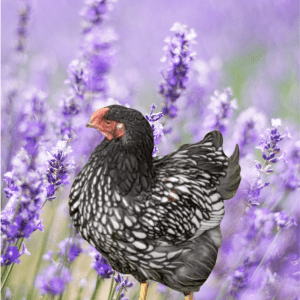
Behavioral and Psychological Benefits
To keep your chickens happy and content, it’s necessary to consider their behavioral and psychological well-being. Herbs such as lavender, chamomile, and lemon balm have calming effects on chickens, reducing stress and promoting relaxation.
The presence of these herbs in the chicken coop can create a more soothing environment, leading to healthier and more relaxed birds. Additionally, providing herbs for your chickens to peck at and explore can stimulate their natural foraging behaviors, keeping them mentally engaged and active.
Repellent Properties Against Pests
Properties of certain herbs can act as natural repellents against common poultry pests like mites, lice, and fleas. Herbs such as mint, lavender, and garlic contain compounds that discourage pests from infesting your flock, reducing the need for chemical treatments.
Chickens benefit not only from the nutritional and immune-boosting advantages of herbs but also from their ability to create a healthier and more pest-resistant living environment. Including herbs in your chickens’ diet and living spaces can have a significant impact on their overall well-being and quality of life.

Safe Herbs for Chicken Consumption
Many herbs that are safe for human consumption can also benefit chickens. These herbs can provide necessary nutrients, act as natural remedies, and even improve the taste of eggs. Below are some safe and beneficial herbs you can feed your chickens:
Parsley: Nutrient-Rich Powerhouse
Chicken can benefit from the high vitamin and mineral content in parsley. It is rich in vitamins A, C, and K, as well as iron and calcium. Feeding parsley to your chickens can help boost their immune system, improve egg quality, and promote overall health.
Mint: More Than Just Fresh Breath
Any mint variety, such as peppermint or spearmint, can be beneficial for chickens. Mint aids in digestion, acts as a natural insect repellent, and has antimicrobial properties. Feeding mint to your chickens can help keep their digestive system healthy and prevent common poultry ailments.
Plus, mint leaves are a natural decongestant and can help alleviate respiratory issues in chickens. The aromatic properties of mint also have a calming effect on the birds, reducing stress levels and promoting overall well-being.
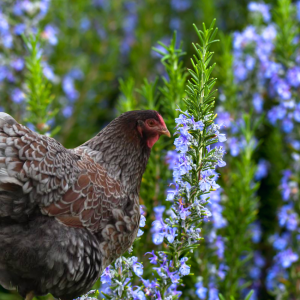
Thyme: Natural Antibacterial
With its natural antibacterial and antifungal properties, thyme can help prevent infections in chickens. Thyme is also rich in antioxidants and can aid in respiratory health. Feeding thyme to your flock can boost their immune system and keep them healthy.
Oregano: The Natural Antibiotic
With its powerful antimicrobial properties, oregano is considered a natural antibiotic for chickens. Oregano can help combat harmful bacteria and parasites, promoting gut health and overall immunity. Feeding oregano to your chickens can reduce the need for antibiotics and boost their health in a natural way.
Other Safe and Beneficial Herbs
Powerhouse herbs like basil, sage, and cilantro can also be safely consumed by chickens. These herbs offer a variety of benefits, from providing necessary nutrients to acting as natural dewormers. Including a mix of safe herbs in your chickens’ diet can enhance their health and well-being.
Safe herbs for chickens are a great way to improve their health and boost their immunity naturally. By incorporating these herbs into their diet, you can support their overall well-being and reduce the need for synthetic medications. Remember to always provide a balanced diet and consult with a veterinarian before making any significant changes to your chickens’ nutrition.
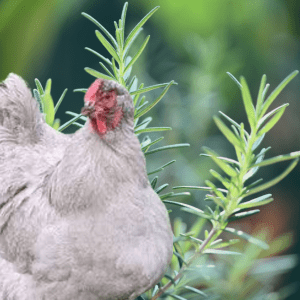
Growing Herbs for Your Chickens
Despite the common misconception that chickens only eat grains, herbs are a great addition to their diets. Not only do they provide vital nutrients, but they also offer natural remedies for common health issues. Growing herbs for your flock can be a rewarding experience that benefits both you and your feathered friends.
Setting Up Your Herb Garden
Herb gardens for chickens can be easily set up in your backyard or even in pots on a patio. Choose a sunny location with well-draining soil to plant a variety of herbs such as parsley, basil, oregano, and dill. Make sure to provide easy access for your chickens to peck at the herbs without causing damage to the plants.
Best Practices for Growing Herbs
Practices for growing herbs for your flock include using organic fertilizers and pesticides to maintain the herbs’ natural benefits. Avoid using chemicals that may be harmful to your chickens or alter the taste of the herbs. Regularly water and prune the herbs to ensure healthy growth and abundant foliage for your poultry to enjoy.
To further enhance the quality of the herbs, consider rotating the planting locations each season to prevent depletion of nutrients in the soil. This practice will help maintain the herbs’ vitality and ensure a steady supply for your flock throughout the year.
Harvesting Herbs for Feeding
Practices for harvesting herbs for feeding involve picking the herbs at the peak of their freshness and flavor. Avoid harvesting herbs when they are wilting or flowering, as the taste may be bitter and less appealing to your chickens. Cut the herbs carefully to encourage regrowth and a continuous supply for your chickens.
This careful harvesting practice will not only provide your chickens with nutrient-rich herbs but also help you maintain a sustainable herb garden that benefits both you and your feathered companions.
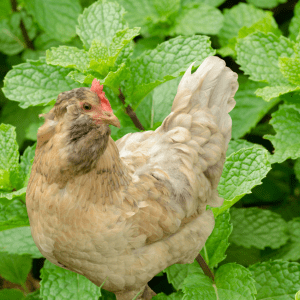
Incorporating Herbs into a Chicken Diet
All chicken owners want to give their flock the best nutrition possible, so why not consider incorporating herbs into their diet? Herbs can provide numerous health benefits for chickens, including boosting their immune systems, improving egg quality, and even acting as natural insect repellents. Here’s how you can effectively introduce herbs into your chicken’s diet.
Methods of Delivery
Herbs can be given to chickens in a variety of ways. One common method is to chop fresh or dried herbs and mix them into their regular feed. This allows your flock to consume the herbs along with their staple diet. Another way is to hang bunches of fresh herbs in the chicken coop for them to peck at leisure. Additionally, you can steep herbs in water to make a herbal tea that can be added to their water dispensers.
Creating a Balanced Diet with Herbs
Herbs are a great way to supplement a chicken’s diet and provide them with crucial nutrients. While herbs should not replace their regular feed entirely, they can add a nutritional boost. Incorporating a variety of herbs can help create a balanced diet that supports overall chicken health and wellbeing. Some herbs, like oregano and garlic, are known for their antibacterial and antiparasitic properties, enhancing the immune system of the flock.
A diet rich in herbs can also improve the flavor of the eggs your hens produce, giving them a unique and more robust taste. By including herbs in their diet, you are not only promoting their health but also potentially enhancing the quality of the eggs they lay.
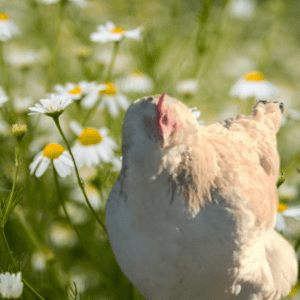
Typical Serving Sizes and Frequency
For chickens, it’s important to provide herbs in moderation. Methods of serving herbs can vary depending on whether they are fresh or dried. A general guideline is to offer a small handful of fresh herbs per chicken per day, or a teaspoon of dried herbs per chicken. It’s best to start slow and monitor how your flock reacts to the new additions to their diet. Gradually increase the amount of herbs as needed.
Observing Your Chickens’ Response to Herbs
Monitoring Health and Behavior Changes
Keep a close eye on your flock after introducing herbs to their diet. Any sudden changes in behavior or health should be noted. Healthy chickens will typically show an interest in the herbs and peck at them with curiosity. However, if you notice any lethargy, decreased appetite, diarrhea, or other concerning symptoms, it may be a sign that the herbs are not agreeing with them.
Adjusting the Herbal Diet as Needed
The key to successfully incorporating herbs into your chickens’ diet is observation and flexibility. If you notice any negative reactions to specific herbs, remove them from the menu and observe if there are any improvements in your chickens’ health and behavior. It is necessary to monitor how your chickens respond to different herbs and make adjustments accordingly to ensure their well-being.
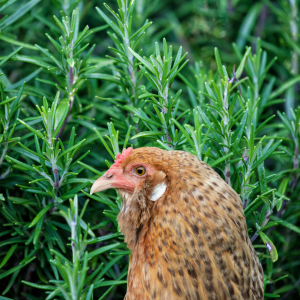
Conclusion on Herbs for Chickens
Hence, it is important to remember that herbs can provide a variety of benefits to your chickens when added to their diet. Not only do they offer nutritional value, but they can also promote good health and help prevent illnesses. To ensure that you are providing safe and suitable herbs for your flock, it is recommended to do thorough research on which herbs are appropriate for poultry consumption.
FAQ’s about Herbs for Chickens
Q: Can I feed herbs to my chickens?
A: Yes, you can feed herbs to your flock. Herbs are not only safe for chickens to consume, but they also provide various health benefits.
Q: What are some herbs that are safe for chickens to eat?
A: Some herbs that are safe for chickens to eat include parsley, basil, mint, oregano, thyme, and dill. These herbs are not only safe but also offer nutritional value to your flock.
Q: How can feeding herbs to chickens benefit them?
A: Feeding herbs to hens can benefit them in many ways. Herbs can help boost their immune system, improve digestion, and even act as natural insect repellents.
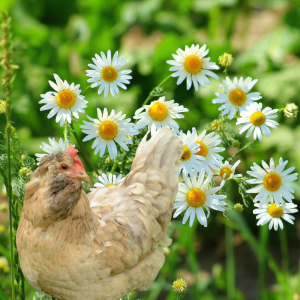
Q: Are there any herbs that are toxic to chickens?
A: Yes, some herbs are toxic to poultry and should be avoided. These include plants like rhubarb, nightshade, and foxglove. It’s crucial to research before feeding any new herbs to your flock.
Q: How should I introduce herbs to my chickens’ diet?
A: You can introduce herbs to your hens diet by offering them small amounts at first and observing how they react. Gradually increase the quantity as needed and make sure to provide a balanced diet with a variety of herbs and other foods.
The Magic of Faverolles CHickens.
Protecting Chickens From Aerial Predators
Silkie Chickens. Magic little balls of fluff.
Adding Dried Herbs to Chicken Feed
5 Tips for a Clean Chicken Coop
Chickens in Winter – Keep Them Healthy and Happy












